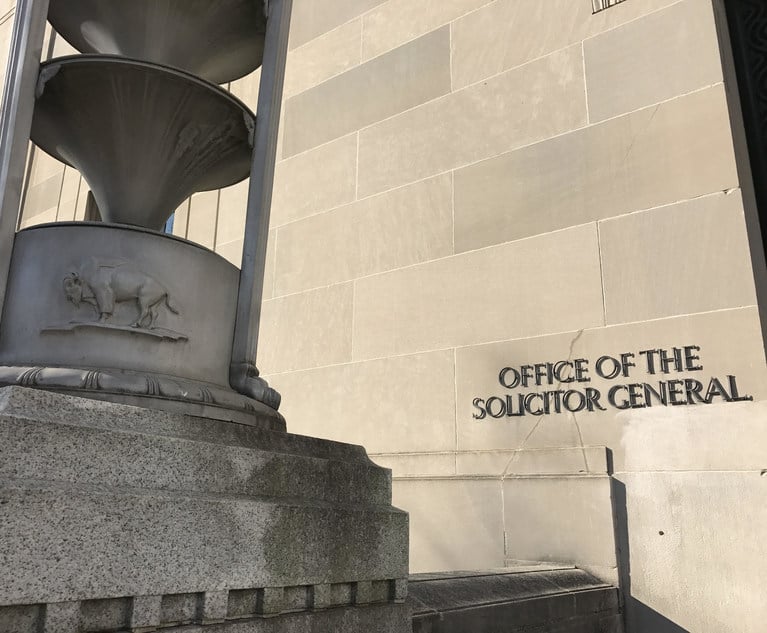Big Law Steps Up in Supreme Court's Major Gun Rights Challenge
Big law has turned out in force in more than 80 friend-of-the-court briefs submitted in the U.S. Supreme Court's major gun rights case in the new term.
October 15, 2021 at 04:15 PM
5 minute read
 Second Amendment rights supporters in front of the Supreme Court, after the Court struck down the D.C. handgun ban. June 26, 2008. Photo: Diego M. Radzinschi/ALM.
Second Amendment rights supporters in front of the Supreme Court, after the Court struck down the D.C. handgun ban. June 26, 2008. Photo: Diego M. Radzinschi/ALM.
Big law has turned out in force in more than 80 friend-of-the-court briefs submitted in the U.S. Supreme Court's major gun rights case in the new term.
In the case, New York Rifle & Pistol Association v. Bruen, the justices have been asked to decide if New York's requirement for a concealed carry license violates the Second Amendment.
The 82 amicus briefs in the case—45 supporting the rifle and pistol association; 37 supporting New York—are not a record number, but they fit comfortably within the totals being filed in hot-button cases in at least the last decade or so. And yet, the number pales next to the 136 amicus briefs filed in the term's abortion challenge to be argued Dec. 1. The 2014-15 term broke a record for the most briefs filed in a single case—147 amicus briefs in the marriage equality case, Obergefell v. Hodges.
"Double- and even triple-digit amicus briefs in a single case also has become the norm," reported Arnold & Porter Kaye Scholer counsel Anthony Franze and partner R. Reeves Anderson in their 2020 annual report on amicus filings. "In seven of the past 10 terms, a single case generated at least 80 amicus briefs. These numbers dwarf the marquee cases of the past, when Roe v. Wade produced 23 amicus briefs and Brown v. Board saw just six."
In this term's gun case, "A number of major national law firms have stepped up and filed briefs on behalf of New York and have not shied away from what is a polarizing issue or an issue that sharply divides people on partisan lines," Adam Skaggs, chief counsel and policy director at the Giffords Law Center to Prevent Gun Violence, said.
Skaggs, whose organization filed an amicus brief supporting New York, said he worked closely with the New York Solicitor General's Office to coordinate its supporting briefs. Giffords' own brief was drafted by Joshua Matz, partner in New York's Kaplan Hecker & Fink.
Other briefs on New York's behalf were drafted by such firms as Arnold & Porter; Davis Wright Tremaine; Perkins Coie; Paul Hastings; Wilmer Cutler Pickering Hale and Dorr; Hogan Lovells; Covington & Burling; Gibson, Dunn & Crutcher; Paul, Weiss, Rifkind, Wharton & Garrison; Morrison & Foerster; Mayer Brown; Cleary Gottlieb Steen & Hamilton; and Cooley.
The rifle and pistol association has drawn amicus briefs drafted by law firms including McGuireWoods; Beck Redden; Cooper & Kirk; Hunton Andrews Kurth; Foley & Lardner; Consovoy McCarthy; Dhillon Law Group; Torchinsky & Josefiak; Williams Mullen; Lehotsky Keller; and Schaerr Jaffe.
In the high court case, Kirkland & Ellis partner Paul Clement is counsel to the rifle and pistol association. New York Solicitor General Barbara Underwood represents the state. Clement did not respond to a request for information on coordination of his side's amicus briefs.
Skaggs said the case is interesting and challenging in that it presents not only the substantive question concerning the constitutionality of New York's concealed carry license requirement but also how courts should approach these cases—what methodology should they use: history, text and tradition, or intermediate scrutiny.
"We tried to ensure we covered all bases and provided the best argumentation whatever basic approach the court takes," he said.
There are the usual competing amicus briefs. For example, two briefs on behalf of linguistic, history and law professors, drafted by Morrison & Foerster partner Brian Matsui, and one by attorney Neal Goldfarb supporting New York argue that corpus linguistics, an empirical approach to researching the use and meaning of language, has assembled a large body of new evidence showing that "keep and bear arms" in the Second Amendment actually possessed a collective, militaristic meaning at the founding.
But the NRA Civil Rights Defense Fund, in a brief by Consovoy McCarthy's Taylor Meehan, counters that the corpus linguistics methodology "at least with respect to the Second Amendment, overemphasizes the elite and the newsworthy, with no way to fully account for the history and tradition of the longstanding and fundamental right of self-defense."
History is again a critical element in this battle. Justice Brett Kavanaugh, while a judge on the U.S. Court of Appeals for the D.C. Circuit, said the test for Second Amendment issues should be to examine history, text and tradition.
History professors go toe-to-toe on the Anglo-American history of laws regulating the carrying of weapons in public. And there are competing briefs on whether Kavanaugh's test or the intermediate scrutiny test used by many federal appellate courts and the Second Circuit in this case is the appropriate constitutional inquiry.
Skaggs said the Giffords Center does a lot of gun-related litigation and has existing relationships with particular law firms. Approaching them for amicus assistance was "easy and natural." Sometimes organizations or individuals would ask the center or the New York Solicitor General's Office for help in finding amicus counsel, he added.
"We worked closely with allies to ensure our goal was to present the court with the broadest range of arguments demonstrating why New York's law is consistent with the history and tradition of regulating guns in public," Skaggs said. "And why from a public safety standpoint, these kinds of laws are critically important to keeping our communities safe."
The justices have scheduled arguments Nov. 3. The audio will be livestreamed from the court's home webpage.
This content has been archived. It is available through our partners, LexisNexis® and Bloomberg Law.
To view this content, please continue to their sites.
Not a Lexis Subscriber?
Subscribe Now
Not a Bloomberg Law Subscriber?
Subscribe Now
NOT FOR REPRINT
© 2025 ALM Global, LLC, All Rights Reserved. Request academic re-use from www.copyright.com. All other uses, submit a request to [email protected]. For more information visit Asset & Logo Licensing.
You Might Like
View All
Trump's DOJ Withdraws Opposition to Law Banning Trans Care for Minors

Supreme Court Denies Trump's Request to Pause Pending Environmental Cases

January Petitions Press High Court on Guns, Birth Certificate Sex Classifications

‘Diminishing Returns’: Is the Superstar Supreme Court Lawyer Overvalued?
Law Firms Mentioned
- Williams Mullen
- Gibson, Dunn & Crutcher
- Paul Hastings
- Morrison & Foerster LLP
- Cooley
- Beck, Redden & Secrest
- Arnold & Porter
- Kindel & Anderson
- Mayer Brown
- Kirkland & Ellis
- Cleary Gottlieb Steen & Hamilton
- Davis Wright Tremaine
- Foley & Lardner
- Covington & Burling
- Paul, Weiss, Rifkind, Warton & Garrison
- McGuireWoods
- Wilmer Cutler Pickering Hale and Dorr LLP
- Perkins Coie
- Hunton Andrews Kurth
- Hogan Lovells
Trending Stories
- 1Ex-Starbucks GC Exiting Latest Role, Will Get Severance
- 2Family Law Special Section 2025
- 3We Must Uphold the Rights of Immigrant Students
- 4Orrick Picks Up 13-Lawyer Tech, VC Group From Gunderson Dettmer
- 5How Alzheimer’s and Other Cognitive Diseases Affect Guardianship, POAs and Estate Planning
Who Got The Work
J. Brugh Lower of Gibbons has entered an appearance for industrial equipment supplier Devco Corporation in a pending trademark infringement lawsuit. The suit, accusing the defendant of selling knock-off Graco products, was filed Dec. 18 in New Jersey District Court by Rivkin Radler on behalf of Graco Inc. and Graco Minnesota. The case, assigned to U.S. District Judge Zahid N. Quraishi, is 3:24-cv-11294, Graco Inc. et al v. Devco Corporation.
Who Got The Work
Rebecca Maller-Stein and Kent A. Yalowitz of Arnold & Porter Kaye Scholer have entered their appearances for Hanaco Venture Capital and its executives, Lior Prosor and David Frankel, in a pending securities lawsuit. The action, filed on Dec. 24 in New York Southern District Court by Zell, Aron & Co. on behalf of Goldeneye Advisors, accuses the defendants of negligently and fraudulently managing the plaintiff's $1 million investment. The case, assigned to U.S. District Judge Vernon S. Broderick, is 1:24-cv-09918, Goldeneye Advisors, LLC v. Hanaco Venture Capital, Ltd. et al.
Who Got The Work
Attorneys from A&O Shearman has stepped in as defense counsel for Toronto-Dominion Bank and other defendants in a pending securities class action. The suit, filed Dec. 11 in New York Southern District Court by Bleichmar Fonti & Auld, accuses the defendants of concealing the bank's 'pervasive' deficiencies in regards to its compliance with the Bank Secrecy Act and the quality of its anti-money laundering controls. The case, assigned to U.S. District Judge Arun Subramanian, is 1:24-cv-09445, Gonzalez v. The Toronto-Dominion Bank et al.
Who Got The Work
Crown Castle International, a Pennsylvania company providing shared communications infrastructure, has turned to Luke D. Wolf of Gordon Rees Scully Mansukhani to fend off a pending breach-of-contract lawsuit. The court action, filed Nov. 25 in Michigan Eastern District Court by Hooper Hathaway PC on behalf of The Town Residences LLC, accuses Crown Castle of failing to transfer approximately $30,000 in utility payments from T-Mobile in breach of a roof-top lease and assignment agreement. The case, assigned to U.S. District Judge Susan K. Declercq, is 2:24-cv-13131, The Town Residences LLC v. T-Mobile US, Inc. et al.
Who Got The Work
Wilfred P. Coronato and Daniel M. Schwartz of McCarter & English have stepped in as defense counsel to Electrolux Home Products Inc. in a pending product liability lawsuit. The court action, filed Nov. 26 in New York Eastern District Court by Poulos Lopiccolo PC and Nagel Rice LLP on behalf of David Stern, alleges that the defendant's refrigerators’ drawers and shelving repeatedly break and fall apart within months after purchase. The case, assigned to U.S. District Judge Joan M. Azrack, is 2:24-cv-08204, Stern v. Electrolux Home Products, Inc.
Featured Firms
Law Offices of Gary Martin Hays & Associates, P.C.
(470) 294-1674
Law Offices of Mark E. Salomone
(857) 444-6468
Smith & Hassler
(713) 739-1250








